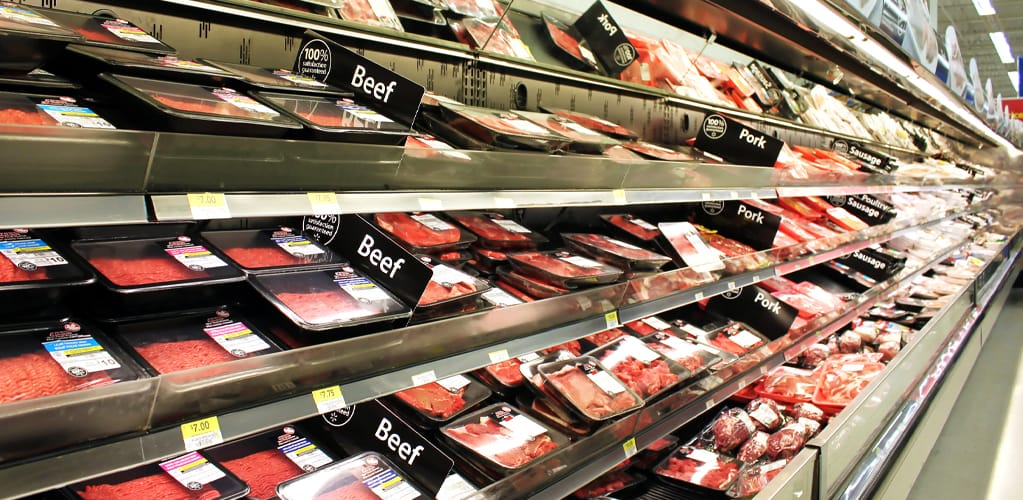How Big Meat worked to rebrand in 2024 — using disinformation
In 2024, the meat industry pushed aggressive rebranding campaigns, spreading disinformation about “natural” meat, eco-friendly claims, and global hunger, while facing growing scrutiny over sustainability, climate impact, and plant-based competitors.

by JESSICA SCOTT-REID —
Features Writer for Sentient Media
covering misinformation and its impact on culture.
Highlights from this story
● Meat industry rebranding promoted “natural”, “eco-friendly”, and “essential” narratives, avoiding accountability in 2024.
● Claims of regenerative agriculture’s sustainability often overstated, co-opted by industrial meat companies.
● Meat promoted as essential for food security, ignoring inefficiencies and climate-related harms.
● Industry-funded research and think tanks undermined plant-based, cultivated meat’s credibility and sustainability progress.
T he meat industry and its proponents worked hard in 2024 — not only to increase sales, but also to rebrand and remain relevant. While overwhelming climate science continues to point out the harmful impacts of animal agriculture, and plant-based competitors continue to challenge the status quo, meat promoters stepped up this year, crafting and perpetuating clever narratives to keep consumers hooked.
“Amidst a climate crisis driven in no small part by agriculture, there is a growing interest in healthy, sustainable food,” Jennifer Molidor, senior food campaigner for the Center for Biological Diversity, tells Sentient. “The industry has responded by flooding climate conferences with lobbyists promoting meat and dairy — in full force.”
And that’s not all. From promoting “beneficial” regenerative meat, to criticizing “ultra-processed” plants, to promoting cow fat for skin care, to manipulating data, Big Meat sidestepped accountability to keep consumers coming back in 2024.
Disinformation Trend #1: Meat Is ‘Natural’
One of the more popular PR messages regarding meat in 2024 was that animal products are healthier and more “natural” compared to “ultra-processed” plant-based meat alternatives.
This messaging is not new. It’s years in the making, with full-page ads in The New York Times and Wall Street Journal back in 2021, and a $5 million Super Bowl commercial in 2020. Backed by the Center for Consumer Freedom (CCF), the ads vilified newly popular “fake meats” as full of “real chemicals,” highlighting “scary” ingredients like methylcellulose — a generally harmless compound used in many foods.
CCF is led by former tobacco lobbyist Richard Berman, and is supported by “restaurants, food companies and thousands of individual consumers,” according to its website. Forbes once described it as a front group for meat, tobacco and alcohol companies.
The narrative of “natural” meat versus “processed” plants persisted into 2024. The marketing tactic conveniently ignores the fact that 99 percent of animals raised for food in the U.S. are factory farmed in inherently unnatural conditions, and undergo much processing to become meat, dairy and eggs.
But this natural meat fantasy didn’t stop at food in 2024, spreading into lifestyle content, and feeding into a growing anti-technology, off-the-grid (though often still on YouTube), homesteading, carnivore and tradwife trend. Raw milk surged in popularity in 2024, as did eating raw meat, and using cow fat for skin care.
The FDA, CDC and New York State Department of Health put out statements this year warning of the health risks of consuming raw milk, and experts have taken to the media to warn of the risks associated with the carnivore diet, and with eating uncooked meat. Dermatology experts also told Sentient that the benefits of beef fat for the skin are minimal.
Though plant-based meat alternatives vary greatly when it comes to nutritional profiles, they are generally considered healthy. In fact, a 2024 review published in the Canadian Journal of Cardiology found that risk factors for heart disease, such as LDL cholesterol and body weight, showed improvement when animal-based meats were substituted with plant-based meat alternatives.
Disinformation Trend #2: Meat Is ‘Eco-Friendly’
Another pervasive meat message in 2024 was that beef — the highest-emitting meat — can somehow be good for the environment so long as raised on a farm that is regenerative, eco-friendly, carbon neutral or some other variation of such terms.
Regenerative agriculture, particularly holistic grazing, promises an alternative to our current food system that incorporates livestock in a way that can regenerate depleted soils. Such promises, however, fall short when it comes to actually curbing climate pollution.
Though regenerative agriculture aims to “bring back bovines,” as described in the 2023 documentary Common Ground, this grouping of grass-fed cattle with wild ruminants like bison is not accurate — at least as far as the environment is concerned. “That’s like comparing apples to oranges,” Molidor told Sentient earlier this year. While there is some debate about this, bison tend to graze over further distances in ways that cause less damage to plants and waterways. Cattle, on the other hand, tend to stick close together and eat just one type of plant until it’s gone.
The regenerative movement — which does offer some benefits for soil health — has also since been co-opted by the industrialized meat industry. A 2024 study by New Climate Institute found that 24 of the world’s top 30 food and beverage producers, including Cargill, Danone and Fonterra, refer to regenerative agriculture in their sustainability communication.
That said, 2024 also saw a possible win in the fight against misleading claims about climate-friendly meat, with Tyson Food’s Brazen Beef brand potentially no longer available for sale. After the U.S. Department of Agriculture rolled out a new “climate-friendly” beef label last year, Tyson soon rolled out its own version: Brazen Beef. Journalists and academics were quick to note serious issues with the claims on the product’s label, particularly the claim (with no data in support) of a 10 percent reduction in emissions.

“In order to claim a 10 percent reduction, you need to establish scientifically a baseline that everyone agrees is the common amount that beef produces,” New York University environmental scientist Matthew Hayek told Corporate Knights Magazine. “There doesn’t seem to be any data that the company itself, or the government who it created that certification in conjunction with, is able to provide.”
Tyson was subsequently sued in 2024 by the Environmental Working Group (EWG) for misleading consumers about its efforts to cut greenhouse gas emissions. The suit asked the Superior Court of the District of Columbia to ban Tyson from making “false or misleading marketing claims.” It remains before the court.
At the time this story was published, the webpage for Brazen Meats was not functioning, and the product appeared unavailable for sale, raising questions about the future of the brand. Sentient contacted Tyson about the status of the Brazen line, but did not receive a response by email. We also called Tyson’s consumer relations hotline, and were told by the representative, “I don’t see anything active with that name.” It also appears that a New Jersey meat packer that sold Brazen Beef no longer lists the product on its website.
Caroline Leary, chief operating officer and general counsel for EWG tells Sentient that despite the Brazen Meats webpage being down, the group “remains committed to holding Tyson accountable, by demanding transparency to ensure that consumers are not deceived by false promises of sustainability,” which still exist elsewhere on its site.
Disinformation Trend #3: Meat Feeds the World
Inflation and food insecurity were also pressing issues in 2024. Meat, dairy and egg industries were there to capitalize, particularly at climate conferences held throughout the year.
At COP28 last spring for example, the Guardian reports that meat lobbyists “celebrated the cut-through of their message that industrial animal agriculture has an important role to play in addressing global hunger.” It adds that U.S. Pork Board representative Jamie Burr also stated that COPs provide an opportunity for U.S. agriculture groups to show how they “feed the world.”
At COP29 last month, the strategy was the same, according to a report by DeSmog. Documents produced by the industry-funded Global Meat Alliance, obtained by DeSmog, encouraged members “to stick to key comms messages, including the idea that meat is beneficial to the environment and will help to ‘feed the world.’”
A spokesperson for the Global Alliance for the Future of Food told the Guardian in April that the idea that industrial agriculture is “critical to address hunger” is one of the greatest myths used by the industry to fend off criticism. Animal agriculture in fact contributes to world hunger, due to the inefficient use of arable land and resources to grow crops for animals, instead of people. Not only that, but the industry’s framing around food insecurity ignores how many climate researchers limit “eat less meat” recommendations to global north populations like the U.S., who consume far more than the global average. Studies suggest that food insecurity could actually be addressed, in-part, by transitioning to a more plant-based food system. Reducing the massive amount of land needed to grow food to feed livestock could lead to more crops being fed directly to people. One study theorizes that if everyone in the U.S. went vegan, an additional 350 million people could be fed.
Disinformation Trend #4: Trustworthy Academic Research Supports Meat
The year 2024 also saw the meat sector lean even further into academia as a means to appear credible and sustainable.
As environmental scientist Jonathan Foley writes for Project Drawdown: “The livestock industry has spent enormous sums telling us fictitious stories of ‘environmentally-friendly’ beef,” including, he notes, “documentaries, think tanks, university labs, and social media influencer campaigns touting so-called ‘solutions’ to beef’s environmental footprint.”
In 2023, the Guardian exposed The Master of Beef Advocacy, or “MBA” program, created by the National Cattlemen’s Beef Association, to help meat promoters influence and educate the public on the “sustainability” of beef. That same year, the National Pork Board funded a nearly $8.5 million program with researchers from a variety of U.S. universities, to research and improve the industry’s reputation by boosting public “trust” in pork factory farms. And the year prior, The New York Times exposed how the UC Davis Clear Center did not disclose just how much industry funding it received to promote the environmental friendliness of meat and dairy, under the guise of public sector science.
In 2024, the meat industry took this method of information manipulation a step further, targeting another major competitor: cultivated meat. Once again backed by Richard Berman, another “think tank” was created, the ironically named Center for the Environment and Welfare, this time under the guise of helping “consumers, companies, and stakeholders navigate issues related to sustainability and animal welfare.” In 2024, the group conducted “research” and published media op-eds to thwart the progress of cultivated meat.
The Bottom Line
In 2024, the meat industry’s aggressive rebranding efforts, fueled by clever messaging and industry-backed research, sought to counteract competition from more sustainable plant-based alternatives.
As the inevitable impacts of climate change — along with other issues like bird flu — usher us into 2025, “it’s going to be increasingly difficult,” Molidor says, “for the meat and dairy lobby to rebrand their way out of these serious environmental and human harms.”

This article by Sentient is published here as part of the global journalism collaboration Covering Climate Now.






[Read our Comments Guidelines]